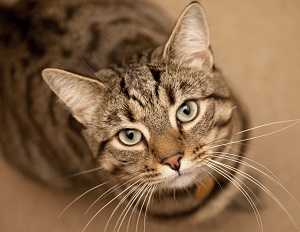Influenza in Cats
On This Page
Cats can be infected with influenza viruses, including avian influenza viruses, and can spread influenza viruses to each other (cat-to-cat). Influenza in cats is thought to spread the same way that human flu spreads: through direct contact (playing or sleeping together, licking, nuzzling); through the air (droplets made from coughing or sneezing, including nasal discharge); and via contaminated surfaces (such as shared food and water bowls, cage surfaces). Some scientific studies suggest that it is not uncommon for people to infect cats with seasonal influenza viruses. Less is known about the risk of an infected cat spreading flu to people. Influenza infection in cats has generally resulted in mild illness in cats.

CDC believes that the risk of human infection with an influenza virus from an infected cats is low, but risk is probably dependent on the characteristics of the virus in question and the duration and intensity of exposure.
CDC has long-standing guidance for cat owners, including that people wash their hands with soap and running water after contact with cats, cat saliva or stool, and after cleaning a litter box. These precautions are even more important for people who are at high risk of serious flu complications, such as those who are being treated for cancer, or who have other chronic health conditions such as diabetes, heart disease, liver disease or kidney disease or women who are pregnant. Any influenza infection can be more serious in these people.
Finding a non-human (novel) influenza virus in an unexpected host (like a domestic cat) is always concerning and any human infection with a novel influenza virus is concerning as well. These incidents are carefully investigated and appropriate actions are taken to ensure that there is no ongoing spread of the novel virus among people.
Information for Cat Owners
Information for Veterinarians
- Health Department Investigation of H7N2 Influenza in Shelter Cats Confirms Risk to Humans is Low
- American Veterinary Medical Association: Avian Influenza in Companion Animals
- 2016 Veterinary Advisory # 1: Influenza A, H7N2 Identified in Cats from Animal Care Centers of New York City Facility in Manhattan [382 KB, 3 Pages]
- 2016 Veterinary Advisory #2: Avian Influenza A H7N2 Update [370 KB, 3 pages]
News
- Avian Influenza A (H7N2) in Cats in Animal Shelters in NY; One Human Infection December 22, 2016
- Health Department Investigation of H7N2 Influenza in Shelter Cats Confirms Risk to Humans is Low December 22, 2016
- Health Department, Animal Care Centers of NYC Report Cases of Rare Influenza Virus Among Cats at ACC’s Manhattan December 15, 2016
- The New York City Department of Health and Mental Hygiene (DOHMH) Press ReleaseDecember 12, 2016
- UW Shelter Medicine, WVDL Assist with cases of influenza in shelter cats December 9, 2016
- Page last reviewed: December 23, 2016
- Page last updated: December 23, 2016
- Content source:
- Centers for Disease Control and Prevention, National Center for Immunization and Respiratory Diseases (NCIRD)
- Page maintained by: Office of the Associate Director for Communication, Digital Media Branch, Division of Public Affairs


 ShareCompartir
ShareCompartir